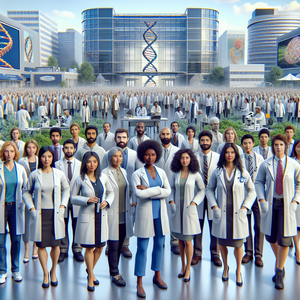
Navigating Career Opportunities for Microbiology Graduates: Insights and Trends
The realm of microbiology opens doors to a multitude of career paths across various sectors, such as healthcare, environmental science, pharmaceuticals, and food production. With a degree in microbiology, graduates are equipped to explore diverse roles that cater to a wide range of interests and expertise. Recent industry analyses indicate a growing demand for microbiologists, underscoring the vital contributions of microorganisms to our health, environment, and economy.
Job Summaries:
Microbiologist:
- Microbiologists delve into the world of microorganisms, studying their interactions and effects on humans, animals, and the environment.
- Their work involves designing experiments, analyzing data, and documenting results.
- These professionals often specialize in areas like clinical, environmental, or industrial microbiology.
- While a bachelor’s degree is typically required, advanced roles may necessitate a master’s or doctoral degree.
- Microbiologists are pivotal in advancing medical treatments, enhancing food safety, and understanding microbial ecosystems.
Laboratory Technician:
- Laboratory technicians play a crucial support role in research and quality control.
- They prepare samples, conduct tests, and maintain equipment.
- A two-year associate degree in laboratory technology is usually needed.
- Strong analytical skills are required.
- Their contributions are vital in settings such as hospitals and pharmaceutical companies.
- They ensure the smooth functioning of experiments.
Quality Control Analyst:
- Quality control analysts are responsible for conducting tests to verify that products meet safety and quality standards.
- Their tasks include performing microbiological tests, interpreting results, and preparing reports.
- A bachelor’s degree in microbiology or chemistry is typically required, alongside meticulous attention to detail.
- This role is particularly significant in the food and pharmaceutical industries, where ensuring product safety is paramount.
Clinical Research Associate:
- Clinical research associates oversee clinical trials, ensuring that new drugs and treatments are evaluated effectively.
- They monitor trial progression, ensure adherence to regulatory standards, and analyze data to support research outcomes.
- A bachelor’s degree in life sciences or a related field is essential, along with strong organizational skills.
- This position is integral to the advancement of medical research.
Biotechnologist:
- Biotechnologists harness biological principles to innovate products and technologies that improve quality of life.
- Their work may encompass genetic engineering, pharmaceuticals, or biofuels.
- A degree in biotechnology or microbiology is vital, along with robust laboratory skills.
- This role is crucial for fostering innovation across various sectors, including healthcare and agriculture.
Food Technologist:
- Food technologists are tasked with developing and enhancing food products to ensure they are safe, nutritious, and appealing.
- They conduct microbiological tests to prevent contamination and improve preservation methods.
- A degree in food science or microbiology is necessary for this role, along with strong analytical capabilities.
- Their work is essential for ensuring food safety and quality.
Environmental Microbiologist:
- Environmental microbiologists investigate microbial processes within ecosystems.
- They focus on nutrient cycling and pollution impacts.
- They conduct field studies and laboratory analyses to understand microbial interactions.
- They study the ecological significance of microbes.
- Typically, a bachelor’s or master’s degree in microbiology or environmental science is required.
- This role is critical in addressing environmental challenges and promoting sustainability.
Medical Laboratory Scientist:
- Medical laboratory scientists perform complex diagnostic tests that aid in disease detection and patient monitoring.
- They analyze biological samples and collaborate closely with healthcare providers to interpret results.
- A bachelor’s degree in medical technology or microbiology is required, along with certification as a medical laboratory scientist.
- This role is indispensable in the medical field, supporting accurate diagnosis and treatment.
Regulatory Affairs Specialist:
- Regulatory affairs specialists ensure compliance with government regulations and industry standards for products.
- They prepare submission documents for product approvals and oversee compliance throughout the product lifecycle.
- A bachelor’s degree in microbiology or a related field is necessary, along with excellent communication skills.
- This role is vital for pharmaceutical and biotechnology companies striving to bring safe and effective products to market.
Immunologist:
- Immunologists study the immune system's response to pathogens.
- They conduct research that leads to the development of vaccines and immunotherapies.
- A doctoral degree in immunology or microbiology is typically required.
- Significant research experience is necessary for this role.
- This role is critical for advancing medical science.
- It helps improve public health through disease prevention.
In summary, the field of microbiology presents a wealth of career opportunities that cater to a variety of interests and skill sets. As the job market for microbiologists continues to expand, graduates have ample chances to make impactful contributions to public health, environmental stewardship, and technological advancements. By exploring these diverse career options and acquiring the necessary qualifications, aspiring microbiologists can successfully chart their paths in this dynamic and essential discipline.
Explore More Jobs

